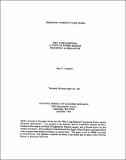| dc.contributor.author | Campbell, John | |
| dc.date.accessioned | 2009-07-22T14:14:40Z | |
| dc.date.issued | 2001 | |
| dc.identifier.citation | Campbell, John Y. 2001. Why long horizons? A study of power against persistent alternatives. Journal of Empirical Finance 8, no. 5: 459-491. | en |
| dc.identifier.issn | 0927-5398 | en |
| dc.identifier.uri | http://nrs.harvard.edu/urn-3:HUL.InstRepos:3196341 | |
| dc.description.abstract | This paper studies tests of predictability in regressions with a given AR(1) regressor and an asset return dependent variable measured over a short or long horizon. The paper shows that when there is a persistent predictable component in the return, an increase in the horizon may increase the R2 statistic of the regression and the approximate slope of a predictability test. Monte Carlo experiments show that long-horizon regression tests have serious size distortions when asymptotic critical values are used, but some versions of such tests have power advantages remaining after size is corrected. | en |
| dc.description.sponsorship | Economics | en |
| dc.language.iso | en_US | en |
| dc.publisher | Elsevier | en |
| dc.relation.isversionof | http://dx.doi.org/10.1016/S0927-5398(01)00037-8 | en |
| dash.license | LAA | |
| dc.subject | long-horizon regressions | en |
| dc.subject | power | en |
| dc.subject | approximate slope | en |
| dc.title | Why Long Horizons? A Study of Power Against Persistent Alternatives | en |
| dc.relation.journal | Journal of Empirical Finance | en |
| dash.depositing.author | Campbell, John | |
| dc.identifier.doi | 10.1016/S0927-5398(01)00037-8 | * |
| dash.contributor.affiliated | Campbell, John | |


